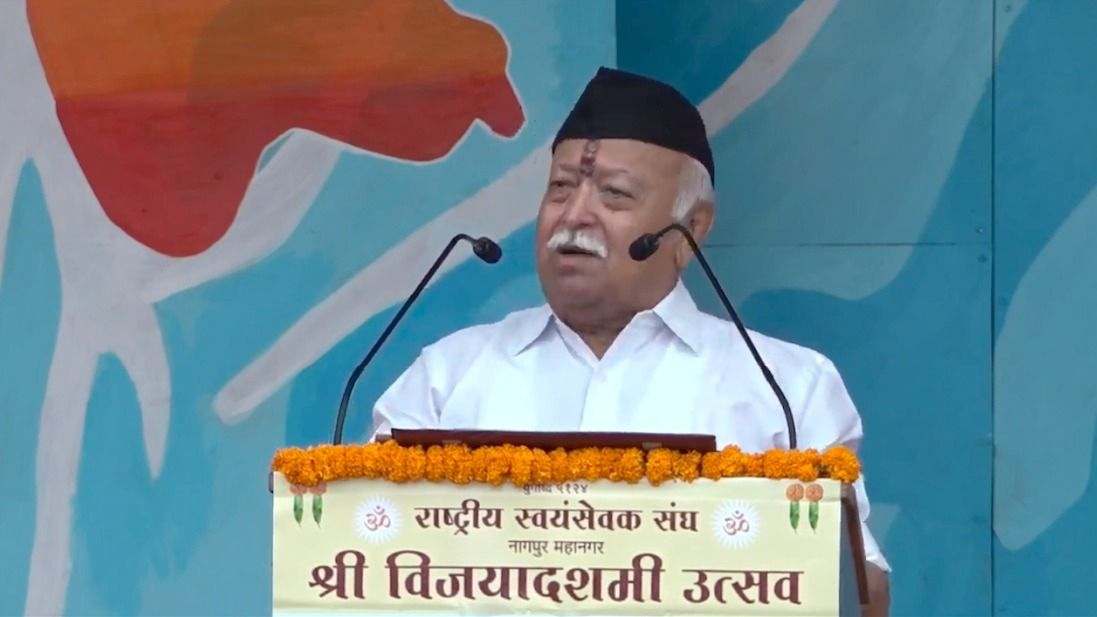JK News Today
Jammu, October 5 :
RSS chief Mohan Bhagwat has underscored the need for a population policy in India that takes care of its development, progress and at the same time not burden the resources.
Speaking at the annual Vijaydashmi event of the RSS, Bhagwat listed several aspects of the population , how it pays dividends but overpopulation drains resources and cause other fault lines impacting society, family values and the growth of the nation apart from raising security concerns which get multiplied by infiltration and forcible conversion.
Here are some of the excerpts of Bhagwat’s speech’
For a country as populous as Bharat, it is a natural expectation that economic and development policy making should be employment-oriented. But employment does not mean simply jobs, this prudence has to expand in our society. No work is insignificant or non-prestigious; manual, financial and intellectual labour are all respectable – we have to recognize this and conduct ourselves accordingly. Enterprise-oriented actions have to be encouraged. Setting up of decentralized employment training programmes in every district, employment opportunities in home districts, development programmes in villages as also education, health, ease of travel – these are common expectations from govt. However, during the pandemic, activists who toiled felt that the organized power of society is also capable of high delivery of services. Organizations working in the financial sector, small scale enterprises, some wealthy individuals, experts in craft skills, trainers and local swayamsevaks alongwith Swadeshi Jagran Manch (SJM) began this project in 275 districts. It’s still early days but they have been able to trigger employment generation significantly –such is the circle.
This emphasis on society’s participation in every sphere of our national life, is not to relieve government of its responsibilities of governance rather it is to emphasize societal partnership for national upliftment and pivot policy making in that direction. Our country has a huge population–this is a reality. Nowadays there are two kinds of evaluation done on population. Populations require resources, if it keeps growing it becomes a big burden, perhaps an unbearable burden. Therefore, with the perspective of population control, plans are made. There is another dimension, in which population is considered an asset. Focus is on appropriate training and maximum usage. When we look at the world population one fact emerges. Only when we look at our country, thoughts may change. China has reversed its population control policy to population growth. Our national interest influences our thoughts on population matters. Today we are the youngest country. 50 years hence, today’s youth will be the future years’ senior citizens, to look after them what size should be our young population, this math we also have to do. With efforts, the people make a country grand, they also carry on their family line and that of society. To beget, preserve and protect a populace apart from being relevant for national identity and security, is a subject that touches some other facets also.
The number of children is linked with maternal health, education, financial status and individual wish. It is also dependent what each family needs. Population impacts the environment also.
In summation, the population policy has to be formulated considering all these factors mindfully. It should be applicable for all; public awareness campaigns will be required for creating a mindset of total observance of this policy. Only then rules pertaining to population control will yield results.
In 2000, the Government of India after multi-stakeholder consultations had framed a population policy. One key goal was to obtain a Total Fertility Rate (TFR) of 2.1. Recently, in 2022, the NFHS report which comes out every five years, has been published. Due to social awareness and constructive co-operative efforts by the central and state governments the TFR has come down below the targeted 2.1 to 2.0. While we are continuously progressing on the front of public awareness and the goals of population control, two more questions are emerging for consideration. Social scientists and mental health experts opine that ultra-nuclear families are posing challenges for the all-around development of young girls and boys, families are feeling a sense of insecurity, social tensions, loneliness etc are presenting testing times and a question mark hangs over the central edifice of our society –the ‘family system.’ Another question of great importance that of population imbalance has arisen. 75 years ago, we experienced this in our country. In the 21 st century, the three new countries that have come into existence, East Timor, South Sudan and Kosovo – they have been the results of population imbalance in certain territories of Indonesia, Sudan and Serbia. Population imbalances lead to changes in geographical boundaries. Alongside the differences in birth rate, conversions by force, lure or greed and infiltration are also big reasons. All these factors have to be mulled over. Population control and religion-based population balance is an important subject that can no longer be ignored.
In a democracy, the value of willing co-operation from people is well-known. The notification of rules, its acceptance and the achievement of desired results happens due to this only. Rules which yield quick benefits or result in gains over time or serve self-interest need not be explained. But when in national interest or in the interests of vulnerable sections, one has to leave selfish concerns, then to prepare people to make such sacrifices, a society has to keep awake their sense of and their pride in who they are.




